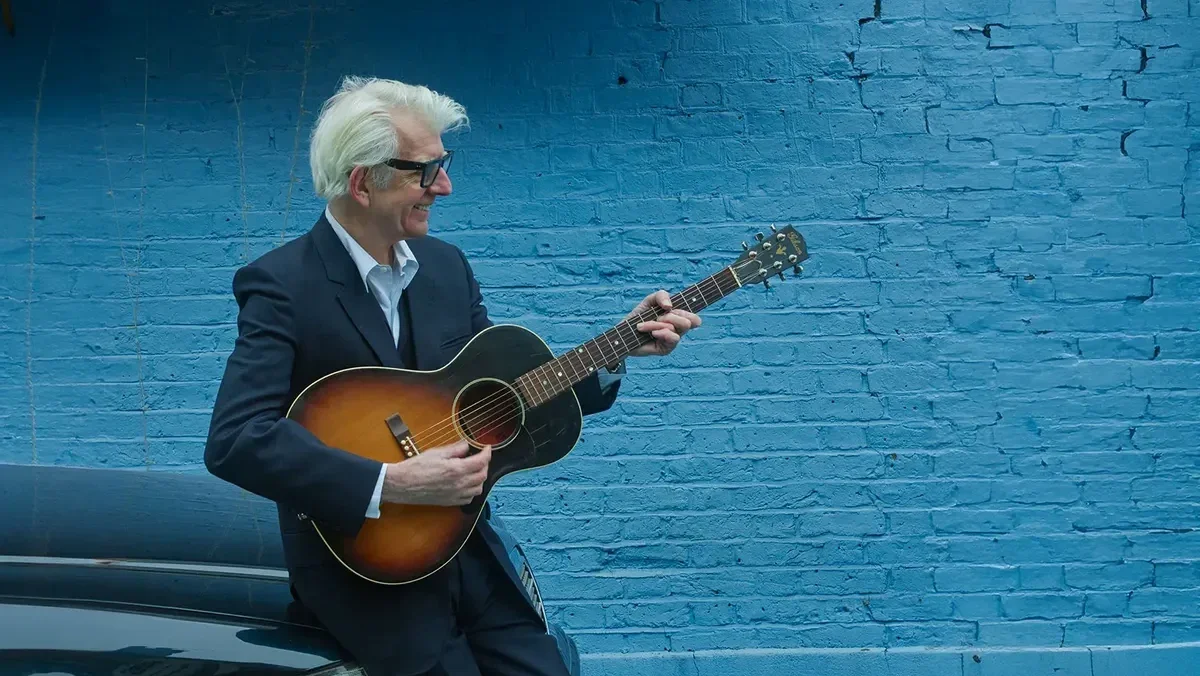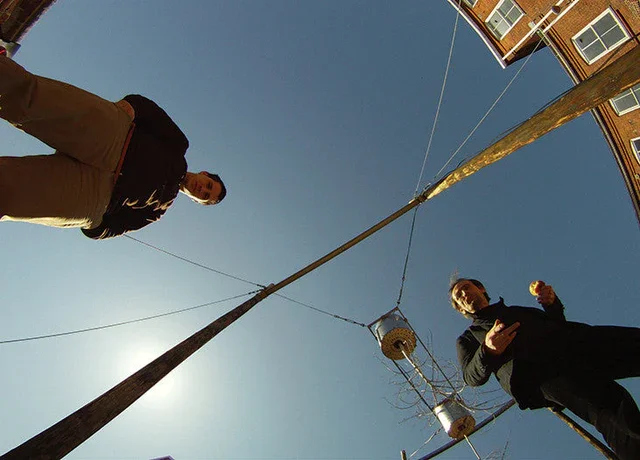Nick Lowe has been making music for 57 years. He has pioneered pub rock, power pop and new wave.
Lowe is often described as “Britain’s greatest living songwriter.” Besides his extensive solo work, he was also a member of the hardworking, propulsive rock band, Rockpile, along with Dave Edmunds, Billy Bremner and Terry Williams.
Lowe’s hit songs include “Cruel to Be Kind,” “The Rose of England” and the iconic “(What’s So Funny ‘Bout) Peace, Love and Understanding,” which was covered by his longtime friend Elvis Costello. Lowe wrote the song in 1974 and 50 years later, its profound message resonates more than ever.
News with a little more humanity
WPR’s “Wisconsin Today” newsletter keeps you connected to the state you love without feeling overwhelmed. No paywall. No agenda. No corporate filter.
Lowe told WPR’s “BETA” that The Holmes Brothers’ version of the song is one of his favorites.
He said he wasn’t sure he wanted to make another album 11 years after his Christmas album, “Quality Street: A Seasonal Selection for All the Family,” which was released in 2013.
Fortunately for his dedicated fans, Lowe changed his mind and worked with his Yep Roc Records’ labelmates, Los Straitjackets. The result is “Indoor Safari.“
Lowe talked with “BETA” about the album and his musical quirks ahead of a performance with Los Straitjackets in Milwaukee on Nov. 1 at the Vivarium.

This interview has been edited for brevity and clarity.
Doug Gordon: The opening song on “Indoor Safari” is “Went to a Party.” It’s the first time you have co-written a song with Los Straitjackets. How did you collaborate with them to create this song?
Nick Lowe: Well, I had the rough idea for it and I didn’t really know if it would work or not. I showed them the outline of my idea and we just sort of put it together.
I thought that they really played a part in putting the song together. And it’s nice to be able to share the love, shall we say, with them and cut everyone in on the publishing because I thought that would be a popular number.
I thought this could work for our little act and and it’s proved to be. It seems to be a very useful little tune.
DG: You and Los Straitjackets are well on the case with a great collection of songs on “Indoor Safari.” One of my favorites is “Crying Inside.” I’m a sucker for lyrical dissonance . You have these slobbin’ tearjerker lyrics paired with this very upbeat, catchy song. Did it start out that way?
NL: Well, it’s a theme — laughing in public, despairing in private — which I recorded in several of my songs. I’m fascinated by it.
And I’m not a putting-your-diary-to-music guy. I just make stuff up. There’s something sort of vaguely humorous about it.
I just thought it was a catchy tune. And it’s not the best song I’ve ever written, but I think it’s a grade-A filler track.
DG: “Indoor Safari” is your first new album in 11 years. Was this delay due to the passing of your longtime drummer Bobby Irwin in 2015 and your producer Neil Brockbank in 2017?
NL: Yes, that did make a make a tremendous impact on me because we were colleagues, but we were such good friends as well. And to lose the two of them, one after the other like that, was quite a blow. It did really did take the wind out of my sails.
They died just before the release of the Christmas record we made. That was the last thing we did together. And I didn’t really want to tour it when the next Christmas came along. But of course, the thing about a Christmas record is that every Christmas, it’s brand new again.
And after a couple of years, it was suggested that I might do some Christmas shows with Los Straitjackets. That’s how that started. And I had no intention really of recording with Los Straitjackets or them with me.
We just got together to do these Christmas shows. I thought that I was done with recording because, what’s that expression about? The definition of madness is doing the same thing over again, expecting a different result.
“I’m much more interested in the craft of songwriting than in telling people what I’ve been up to.”
Nick Lowe
DG: Another great song on the new album is “Blue on Blue.” I love the guitar riff on that one. What’s the origin story behind this song?
NL: I wrote that when I was on holiday in Italy, and it was incredibly hot. There was a massive heatwave. So we had to spend most of the day in the farmhouse we’d rented with the blinds, with everything shut to keep the sun out. And it was almost in the pitch, pitch dark.
And I started writing that song. But again, it’s not autobiographical, really. I’m 75 and I’ve experienced most of the ups and downs that everyone else experiences in their life. I know what it’s like to have my heart broken, how to feel lonely, how to feel abused and mistreated, how it feels to abuse and mistreat other people and all those sort of things.
And so I used that in my songwriting. But it’s not necessarily about me. I make it up. I think of myself really as much more of a craftsman than an artist. I make artistic decisions when I’m writing songs, but I don’t think that I have to tell people about my day-to-day experiences, which aren’t particularly interesting. I’m much more interested in the craft of songwriting than in telling people what I’ve been up to.
DG: One of the Los Straitjackets’ guitarists, Greg Townson, has said that when he heard you play solo guitar for the first time, there was something about your style that threw him off. What was it?
NL: Well, I’ll have him fired immediately for making comments like that. (Laughs). I’ll have to quiz him about it.
As you know, he certainly never made that clear to me. I hope he was sort of paying me a compliment in some way.
DG: He was. Do you want the answer?
NL: Yeah, please do.
DG: I found the answer in Will Birch’s excellent biography, “Cruel to Be Kind: The Life and Music of Nick Lowe.”
So anyway, what Greg said was that perhaps you were in an open tuning or that you had dropped your low E string down to D. Then he realized it was the voicings that you used. Also that you used your fingers and that gives a rich sound. You put your nail polish on so you can have a percussive attack if you want to, without breaking a nail. Does that sound right?
NL: Well, yeah, I’ll never win any awards for my guitar playing. I’m certainly no virtuoso, but I can play. I can definitely play in time. So my rhythm style is is good from that perspective.
As you say, I go to the nail bar every so often and get acrylic put on my nails so that I don’t break them when I whack the strings because I don’t use a pick.
So I use my thumb and strum it with my thumb or I use my fingers. So I’ve got about four or five sounds I can make just by hitting the strings in a different way. And I suppose that’s what he means.
I’m just trying to make my meager guitar playing talents spread as far as they will go.
DG: You have said that you welcome in the things that you don’t really like about yourself. And I find this kind of vexing because you’re Nick Lowe. What is there not to like about yourself?
NL: Well, quite a lot of things, really. I suppose it all comes down to Johnny Cash (Lowe’s step-father-in-law) in fact. He once said to me, “Nick, what you’ve got to do in this business is to figure out how to be yourself.”
And I remember when he said that to me, I was very disappointed and thought, man, can’t you come up with something a little bit better than that?
It’s a bit of a cliche, but the older I’ve got, the more I understand what he was getting at because he definitely had figured out how to be himself. Nobody else was like Johnny Cash. He was totally, totally unique, even though he’s influenced loads of people.
But it’s because he managed to make a virtue out of the fact that his voice was kind of wobbly. And yet everyone loved it. His first record, he figured that out and figured that that’s what touched people and was the soulful thing.
And when you start out when you’re young, you’re trying to copy an act. If you’re trying to impersonate someone who’s a hero of yours and you think, “No one wants to come see me because I’m not interesting enough.” So you’re always trying to pretend you’re somebody else until it gets to a stage when you think, “What the heck is the point of this? I might as well just cop to it.”
The fact that I’m a white, middle-class guy, you know, I’m not from Nashville or Memphis. I’m from the suburbs of London. So you’ve got to just embrace it.
DG: A quick question for you, Nick. Is there a song by another artist that you wish you had written?
NL: My God. Just so, so many. The one that springs to mind straightaway is “The Dark End of the Street,” I suppose, by James Carr. I think that’s a beautiful song.
DG: Another one that comes to mind is Arthur Alexander’s “In the Middle of It All.” You did a great version of it for the Arthur Alexander tribute album, “Adios Amigos.“
NL: Yes, funnily enough, I’ve been singing that in sound checks in the last couple of days. It’s a super song. I love Arthur Alexander. He’s great.




